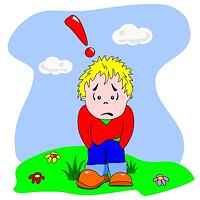 If you think that only grownups get migraines, think again: Pediatrician statistics in the United States indicate that two percent of two-year old children are affected by symptomatic headaches consistent with the migraine condition. As these young migraine patients grow up, their episodes may be exacerbated by certain behaviors and activities. Up to 10 percent of adolescents may suffer from migraines at any given time.
If you think that only grownups get migraines, think again: Pediatrician statistics in the United States indicate that two percent of two-year old children are affected by symptomatic headaches consistent with the migraine condition. As these young migraine patients grow up, their episodes may be exacerbated by certain behaviors and activities. Up to 10 percent of adolescents may suffer from migraines at any given time.Research studies into the causal factors of migraines indicate that these terrible headaches are not entirely physiological. At one point, medical researchers believed that migraines were part of a vascular disease affecting the blood vessels that keep the brain oxygenated. These days, however, physicians believe that migraines are intricately tied to our complex chemistry and may occur at just about any age.
Like Mother, Like Daughter?
The migraine condition seems to be hereditary. Although women are far more likely to suffer from migraines than men, girls are actually less likely than boys to get these terrible headaches during their childhood years. About 70 percent of all migraine patients have an immediate relative who has suffered from the same condition, and this is relative is likely to be female.The majority of migraine episodes in children occur without auras. Some children with vascular or neurological conditions are affected by migraines, but this is not always the case. Many boys who suffer migraine episodes end up growing out of them, but this is not often the case for girls. In fact, girls are more likely to develop chronic migraines if their mothers are affected by this condition as well.
Stress and Other Childhood Migraine Triggers
When it comes to stress and life changes, children tend to be more sensitive than adults. For this reason, they are more susceptible to developing migraines as they go through hormonal changes and other growing pains. Moving to another town, changing schools and parental separation are considered major triggers of childhood migraines.Parents of children who suffer from migraines should pay attention to certain foods that can act as triggers. Unfortunately, these include some childhood favorites such as pizza, hot dogs, corn chips, and chocolate. These nutritional triggers can be identified by keeping a migraine diary that lists foods consumed by children before their migraine episodes.
Migraine Treatment for Young Patients
When it comes to living with migraines, children tend to be very receptive to positive lifestyle changes. Physical activity and proper nutrition can go a long way in providing relief. For episodic migraine sufferers, their condition can be treated symptomatically with over-the-counter medications.
Preventive medication therapy is sometimes recommended for children who have a neurological condition that triggers migraines. The medications used in these cases may include antidepressants and anticonvulsants.
It is important to remember that early intervention and treatment can be very beneficial for children and adolescents. Failure to treat migraines from an early age can change the condition from episodic to chronic.
*Image courtesy of freedigitalphotos.net

